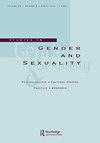女权主义话语中的战争隐喻:反对伦理暴力的颠覆性立场
Q3 Social Sciences
引用次数: 0
摘要
ABSTRACT 战争隐喻在与女权主义相关的话语中无处不在,将活动家描绘成反对父权制的战士。批判性话语分析的最新研究表明,在政治事务中使用战争隐喻既有积极意义,也有消极影响。赋权语言的使用揭示了女权主义者在构建自身叙事时所采取的颠覆性立场。根据朱迪斯-巴特勒(Judith Butler)关于伦理暴力的观点,我们将女权话语中的颠覆性立场视为对性别符号构建中暴力伦理的一种回应。我们将这一观点与日泽克-拉康方法进行对比,将排斥暴力理解为拉康 "真实 "对符号施加限制的结果。我们从巴特勒和拉康的视角分析了性别化的概念以及性别与性别之间的差异。我们区分了女性主义和拉康式的女性逻辑,强调了从受害者/战士符号对说话者的功能角度对其进行定位的重要性。在最后一节中,我们本着承认主体的单一性和不完整性的精神,根据拉康的 "非全部"(not-all)逻辑,提出了在女权主义话语中贬低女性的取向。本文章由计算机程序翻译,如有差异,请以英文原文为准。
War Metaphors in Feminist Discourse: A Subversive Position against Ethical Violence
ABSTRACT War metaphors are ubiquitous in feminism-related discourse, portraying activists as warriors against patriarchy. Recent research in critical discourse analysis shows positive and negative implications of using war metaphors in relation to political matters. The use of empowerment language reveals a subversive position taken by feminists in the construction of its own narrative. Building on Judith Butler’s idea of ethical violence, we examine the subversive position in feminist discourse as a form of response against the violent ethos that inhabits the symbolic construction of genders. This view is contrasted with Žižekian–Lacanian approaches to understand violence of exclusion as an effect of the Lacanian Real imposing a limit to the symbolic. The notion of sexuation and difference between gender and sex is analyzed from Butler´s and Lacanian perspectives. We distinguish between feminism and the Lacanian logic of the feminine, emphasizing the importance of situating the victim/warrior signifiers in terms of the function they fulfill for a speaking being. In the final section we propose an orientation toward devictimization of women in feminist discourse, in the spirit of recognition of the singularity and incompleteness of the subject in line with the logic of the Lacanian not-all.
求助全文
通过发布文献求助,成功后即可免费获取论文全文。
去求助
来源期刊

Studies in Gender and Sexuality
Social Sciences-Gender Studies
CiteScore
0.80
自引率
0.00%
发文量
15
期刊介绍:
Beginning in the final two decades of the 20th century, the study of gender and sexuality has been revived from a variety of directions: the traditions of feminist scholarship, postclassical and postmodern psychoanalytic theory, developmental research, and cultural studies have all contributed to renewed fascination with those powerfully formative aspects of subjectivity that fall within the rubric of "gender" and "sexuality." Clinicians, for their part, have returned to gender and sexuality with heightened sensitivity to the role of these constructs in the treatment situation, including the richly variegated ways in which assumptions about gender and sexuality enter into our understandings of "normality" and "pathology."
 求助内容:
求助内容: 应助结果提醒方式:
应助结果提醒方式:


